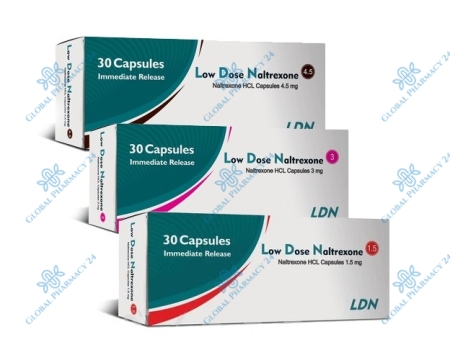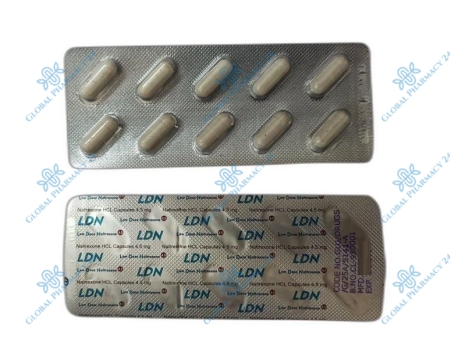| Characteristic | Detail |
|---|---|
| Active Ingredient | Naltrexone Hydrochloride |
| Dosage Forms | Tablets (50 mg), Extended-Release Injectable Suspension |
| Indications | Alcohol dependence, Opioid dependence, Chronic pain management, Cognitive health improvement |
| Duration of Action | Oral: 24 hours, Injectable: 1 month |
| Common Side Effects | Nausea, Headache, Dizziness, Fatigue |
Understanding Naltrexone's Role in Pain and Cognitive Health
Naltrexone, a medication primarily known for its use in treating alcohol and opioid dependence, has emerged as a promising agent in managing chronic pain and enhancing cognitive health. Its role extends beyond its original indications due to its unique mechanism of action, which involves blocking opioid receptors in the brain. This blockade is believed to modulate the pain pathways and cognitive functions, offering relief and improved quality of life to patients suffering from chronic pain conditions and associated cognitive impairments like 'brain fog.'
Recent studies have shed light on the potential benefits of low-dose naltrexone (LDN) for chronic pain management and cognitive enhancement. LDN is thought to reduce inflammation and neuroinflammation, key contributors to the sensation of pain and cognitive dysfunctions. By dampening the inflammatory response and possibly resetting the body's pain threshold, naltrexone provides a novel approach to pain management that could complement traditional therapies, emphasizing its versatility in treating complex conditions.
Unraveling the Link Between Naltrexone, Chronic Pain, and 'Brain Fog'
The relationship between naltrexone, chronic pain, and cognitive health is intricate, with evidence suggesting that LDN's anti-inflammatory effects can significantly impact both. For individuals with chronic pain, the reduction in inflammation can lead to substantial pain relief, while the same anti-inflammatory properties may improve cognitive clarity by alleviating 'brain fog.' This dual action underscores naltrexone's potential as a multifaceted treatment option, addressing both physical and cognitive symptoms that often coexist in chronic conditions.
How Naltrexone Works to Alleviate Symptoms
Naltrexone's efficacy in alleviating chronic pain and cognitive symptoms lies in its ability to block opioid receptors. This blockade leads to a decrease in the perception of pain and, over time, may result in the downregulation of the body's pain response system. Additionally, the reduction of inflammatory markers, which are often elevated in conditions associated with chronic pain and cognitive decline, further contributes to symptom relief.
The Safety Profile of Naltrexone
Naltrexone is generally well-tolerated, with a safety profile that makes it suitable for long-term use in managing alcohol and opioid dependence, as well as off-label uses such as chronic pain and cognitive enhancement. The most common side effects include nausea, headache, dizziness, and fatigue, which are typically mild and decrease in severity with continued use. Serious side effects are rare but can include liver toxicity, especially at higher doses, underscoring the importance of monitoring liver enzymes during treatment.
Given its safety profile, naltrexone is considered a viable option for patients who have struggled with other treatments. Its use in a low-dose form further minimizes the risk of adverse effects, making it an appealing choice for individuals seeking alternative or adjunctive treatment options for chronic pain and cognitive issues.
Analyzing Safety Data and Research
Extensive research and clinical trials have confirmed naltrexone's safety and efficacy for its approved indications and off-label uses. Studies focusing on low-dose naltrexone have particularly highlighted its favorable safety profile, even when used over extended periods. Ongoing research continues to monitor and evaluate the long-term implications of naltrexone use, ensuring that it remains a safe option for patients.
Efficacy of Naltrexone
Naltrexone's effectiveness in treating alcohol and opioid dependence is well-documented, with numerous studies supporting its role in reducing cravings and preventing relapse. Its efficacy extends to off-label applications, such as managing chronic pain and improving cognitive function, where it offers a unique mechanism of action different from traditional therapies. The modulation of opioid receptors and the reduction of inflammation provide a therapeutic avenue that addresses the underlying causes of these conditions.
In the realm of chronic pain management and cognitive health, naltrexone presents a promising alternative or adjunct to conventional treatments. Its ability to improve quality of life for individuals with complex, multifaceted conditions is a testament to its versatility as a medication. Ongoing and future clinical trials will likely further elucidate its full therapeutic potential across a broader range of indications.
Case Studies and Clinical Trials
Evidence from case studies and clinical trials underscores naltrexone's efficacy in a diverse array of conditions. These studies reveal significant improvements in patients' symptoms, from reduced pain intensity in chronic pain conditions to enhanced mood and cognitive function. The growing body of research supporting naltrexone's use beyond its original indications is a powerful advocate for its broader application in clinical practice.
The Patient Journey with Naltrexone
Starting treatment with naltrexone marks the beginning of a new chapter for patients seeking relief from alcohol and opioid dependence, chronic pain, or cognitive impairments. The journey involves close monitoring by healthcare professionals to ensure the medication's efficacy and adjust dosages as needed. Patients are educated on the importance of adherence to the prescribed regimen and informed about the potential side effects and how to manage them.
The supportive role of healthcare providers is crucial in navigating the challenges and milestones of treatment with naltrexone. By fostering an open dialogue and providing comprehensive care, providers can help patients maximize the benefits of naltrexone while minimizing potential drawbacks, ultimately enhancing the treatment outcome.
Common Side Effects and How to Manage Them
While naltrexone is generally well-tolerated, some patients may experience side effects such as nausea, headache, dizziness, and fatigue. Healthcare providers often recommend taking naltrexone with food to mitigate nausea and advise patients to rest and stay hydrated to manage headache and dizziness. Most side effects diminish over time as the body adjusts to the medication. Patients should report persistent or severe side effects to their healthcare provider for further assessment and management.
Comparison and Conclusions
Comparing naltrexone to other treatments reveals its unique position in the management of alcohol and opioid dependence, chronic pain, and cognitive issues. Its mechanism of action, which targets opioid receptors and reduces inflammation, offers advantages over traditional therapies that may not address these underlying factors. Additionally, its favorable safety profile and the option for low-dose administration enhance its appeal as a versatile treatment option.
However, it is crucial for patients and healthcare providers to consider the individual's health status, potential side effects, and the comparative effectiveness of naltrexone relative to other treatments. This comprehensive approach ensures that the decision to use naltrexone is informed by a balanced consideration of its benefits and limitations.
Advantages and Disadvantages of Naltrexone
- Advantages:
- Effective in reducing cravings and preventing relapse in alcohol and opioid dependence.
- Shows promise in managing chronic pain and improving cognitive health through its anti-inflammatory effects.
- Generally well-tolerated with a favorable safety profile.
- Available in oral and injectable forms, offering flexibility in administration.
- Disadvantages:
- Potential side effects, such as nausea and dizziness, though these are generally mild and temporary.
- May require careful monitoring and dose adjustments to optimize treatment outcomes.
- Limited awareness and acceptance in the medical community for off-label uses.
Naltrexone vs. Other Treatments: A Comparative Overview
When compared to other treatments for alcohol and opioid dependence, chronic pain, and cognitive health, naltrexone stands out for its unique approach to modulating opioid receptors and reducing inflammation. Unlike treatments that primarily manage symptoms, naltrexone addresses underlying mechanisms, potentially offering more sustainable relief. However, the choice of treatment must be personalized, considering the patient's specific condition, preferences, and response to previous therapies.
Concluding Remarks on Naltrexone's Role in Chronic Pain Management and Cognitive Health
In conclusion, naltrexone represents a significant advancement in treating alcohol and opioid dependence, with expanding applications in chronic pain management and cognitive health improvement. Its efficacy, safety profile, and mechanism of action make it a valuable addition to the therapeutic arsenal. Ongoing research and clinical practice will further define its role, helping countless individuals achieve better health outcomes.
FAQs Naltrexone
What is Naltrexone?
Naltrexone is a medication primarily used to manage alcohol or opioid dependence. It works by blocking the effects of opioids in the brain, reducing cravings and the rewarding effects of these substances.
How does Naltrexone work?
Naltrexone works by blocking opioid receptors in the brain, preventing the effects of opioids such as euphoria and sedation. This helps reduce cravings and the desire to use opioids or alcohol.
What are the common side effects of Naltrexone?
Common side effects of Naltrexone may include nausea, headache, dizziness, fatigue, and insomnia. Some individuals may also experience muscle or joint pain, decreased appetite, or anxiety.
Can Naltrexone be used to treat opioid overdose?
No, Naltrexone should not be used to treat opioid overdose. In cases of opioid overdose, emergency medical attention is required, which may involve the administration of medications such as naloxone to reverse the effects of opioids.
Is Naltrexone addictive?
No, Naltrexone is not addictive. It does not produce the same euphoric effects as opioids, and there is little to no potential for abuse or dependence when used as prescribed.
How is Naltrexone administered?
Naltrexone can be administered orally in the form of tablets or as an extended-release injection. The appropriate dosing regimen will depend on the individual's condition and treatment goals, and it should be prescribed and monitored by a healthcare professional.
Is it safe to drink alcohol while taking Naltrexone?
While Naltrexone can help reduce alcohol cravings, it is not a substitute for abstinence or other forms of alcohol dependence treatment. Drinking alcohol while taking Naltrexone may diminish its effectiveness and increase the risk of adverse effects. It's essential to follow your healthcare provider's recommendations regarding alcohol consumption while on Naltrexone.



















